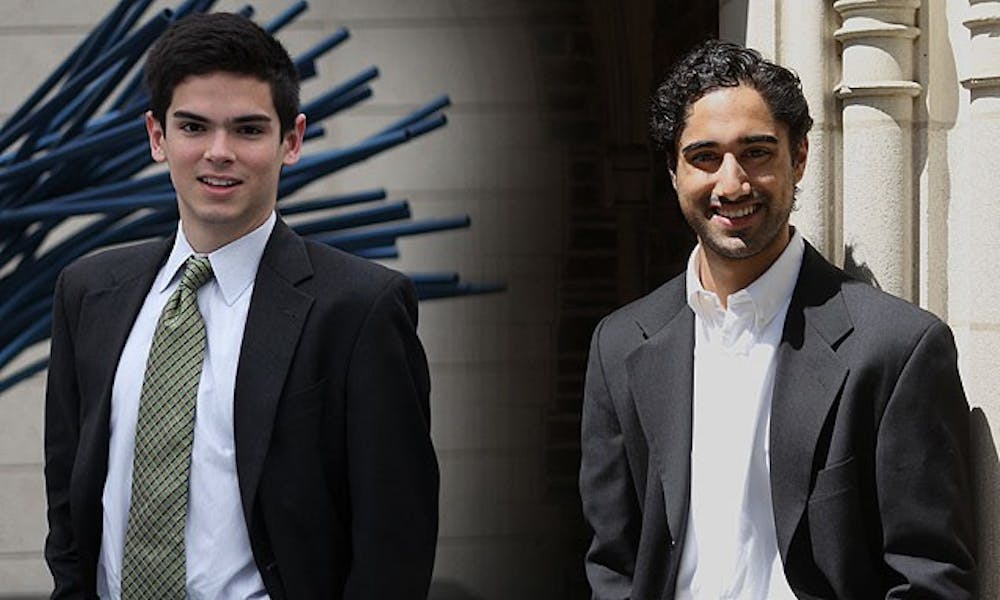Two candidates are vying to be the second-highest ranking officer of Duke Student Government.
Sophomore Gurdane Bhutani, vice president for student affairs, and freshman Patrick Oathout, an academic affairs senator and rules committee member, are currently in the running for DSG executive vice president. The candidates represent opposing viewpoints on DSG priorities and how the executive vice president can help to achieve them.
One of Bhutani’s top priorities if elected would be to reevaluate the role itself. He said he would like to change the position, which currently deals primarily with the internal affairs of DSG, to one focused more on policy.
“Not only will [changing the role] improve the Senate’s efficiency, but it will also allow the [executive vice president] to work on issues that really matter to the student body,” Bhutani said. “It’s silly for someone who has built strong relationships with administrators to give that up and work on internal issues.”
The internal issues usually dealt with by the executive vice president would be delegated to the president pro tempore—a position that has potential but is currently underutilized, Bhutani said.
Three policy issues are particularly important to Bhutani: financial aid reform, the house model transition and the student conduct resolution process.
Bhutani would like to make allocation standards for financial aid more transparent for students and increase work-study jobs and available aid options for international students. Bhutani said he believes the financial aid advisory committee that he created this year to incorporate the student perspective prepared him for improving aid policy.
To ensure housing equity during the transition from the quad model to the house model, Bhutani wants to reassess the Residential Group Assessment Committee and empower both independent and affiliated students.
Bhutani also wants to focus on changing the way administrators and DSG deal with student conduct issues. He said the current process is ambiguous because students can be punished without justification. Bhutani hopes to create a Bill of Student Rights to guarantee certain protections throughout the conduct process.
“If you look at communication from top administrators, it is only in times that we’ve done something terribly wrong,” Bhutani said. “There are very few avenues for interacting with those running the University.”
DSG President Mike Lefevre, a senior, said Bhutani’s leadership has “radically transformed” during his tenure as vice president for student affairs.
“You look for dependable people on DSG, people who haven’t lost their creativity,” Lefevre said. “[Bhutani is] one of the people I can count on most.”
Oathout said he decided to run for executive vice president because of his passion for the functions of the role itself.
“I really just love the formalist, internal coordination that [the position] requires,” Oathout said. “I think it’s a position that I would do really well at.”
Oathout supports the DSG constitutional definition of the role of executive vice president, whose main responsibilities include presiding over the Senate and convening and chairing meetings.
If elected, Oathout wants to make DSG more accessible to students who want to participate. He said the election process and the closed-off nature of the organization are intimidating for students who wish to take part.
He also wants to re-emphasize the importance of parliamentary procedure during Senate meetings, adding that his experience in high school student congress taught him how following parliamentary procedure greatly increases meeting efficiency.
Oathout believes he has the ability to transform ideas into substantive action.
“My policies and platform are really focused and feasible,” Oathout said. “When I come up with an idea, I am looking for the result at the end.”
As executive vice president, he said he will use his results-oriented approach to help senators realize their legislative goals. As a senator, Oathout has worked on a variety of legislation, including reforming the DSG attendance policy and the residential bylaw amendments.
Promoting institutional collaboration between student governments from neighboring institutions—such as the University of North Carolina at Chapel Hill, North Carolina State University and North Carolina Central University—would be one of his top priorities.
“If we want to improve relations with Durham—since some argue that relations are strained—it’s important to have collaboration with N.C. Central, where almost half of Durham college students attend,” Oathout said.
Senior Joe Catapano, senator for academic affairs, said Oathout has the technical savvy and leadership ability to successfully serve as executive vice president.
“Patrick’s really a go-getter,” Catapano said. “He saw things in the Senate that he didn’t think worked from a rules perspective, and he worked to change them. I don’t know if I have seen someone who has hit the Senate floor that fast.”
Get The Chronicle straight to your inbox
Signup for our weekly newsletter. Cancel at any time.

